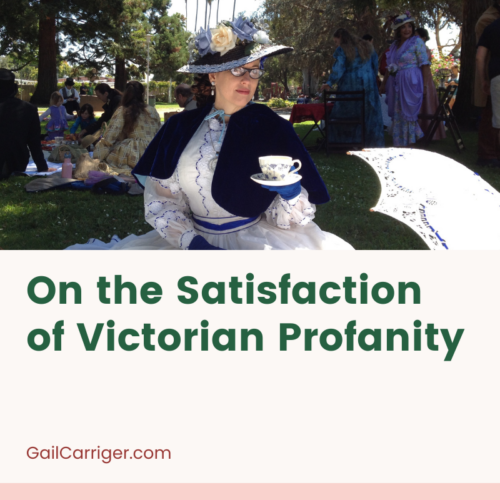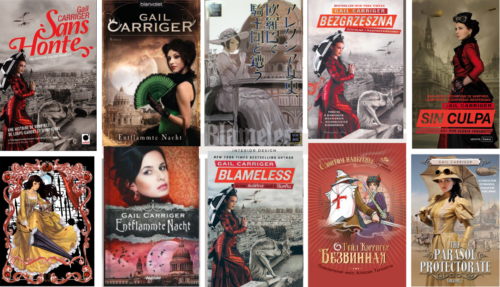Warning, this post, may, or may not, be considered explicit. Judge for yourself, you poodle-faker Gentle Reader!

I don’t know what it says about me as an author, Gentle Reader, but as I move along through this series, I seem to find myself in need of more and more swear words.
(And, before you ask, no that does not mean Alexia has suddenly taken to canoodling with the blowhards down dockside.)
Fun With Victorian Profanity
The fun of this is, of course, that the Victorians had such delicious profanity like:
- pea-brain,
- lack-wit,
- and ninny-hammer. (What exactly, one wonders idly, is a ninny-hammer? Perhaps better not to ask.)
Or, if you are Miss Alexia Tarabotti, you might get overly enthusiastic and use all three at once:
“You pea-brained lack-witted ninny-hammer!”
My research has shown (don’t ask) that many of the slightly less common, but still repulsive, short-syllable expletives of the current day were in use during Victorian times as well.
(Oh, all right, I’ll tell you: court records from the seedier end of town faithfully record the sailor and soldier lingo as hurled at some poor bobby from the dock.)
But what is fun, is finding the ones that will past muster in printed matter under the eagle eye of my editor, and, it-goes-without-saying, also not lower the tenor of the book – like poodle-faker.
(Yes poodle-faker – a young man too much given to taking tea with ladies.)
Other GOOD Words
The thing is (and there’s always a thing) the English language is peculiarly rich with luscious words like:
- kafuffle,
- tatterdemalion,
- curdle,
- spelunking,
- frippet,
- pollock,
- macerate,
- waddle,
- shenanigans,
- plonker,
- booby,
- and kumquat.
I wonder often about other linguistic cultures: do they have equally satisfying words? Or even the concept of satisfying mouth feel? Do they enjoying saying them the way we do? Is the mouth feel the same if you grow up speaking a different language? Or is it mostly English, with our eccentric enthusiasm for alliteration and ruthless penchant for scrumping words from other cultures, who can take satisfaction from the word alone without its meaning?
(Speaking of which, whoever could possibly have thought “vacuum” a good idea?)
Or am I being linguistically superior and speaking nothing more than preposterous twaddle?
Quote of the Day:
“For your born writer, nothing is so healing as the realization that he has come upon the right word.”
~ Catherine Drinker Bowen
BOOK DE JOUR!
Blameless: Parasol Protectorate Book 3
PICK YOUR VENDOR!
Quitting her husband’s house and moving back in with her horrible family, Lady Alexia Maccon becomes the scandal of the London season. Queen Victoria dismisses her from the Shadow Council, and the only person who can explain anything, Lord Akeldama, unexpectedly leaves town.
Find my books
Direct | Amazon | Kobo | Bookshop.org | B&N | Apple | Foyles | Mcnally Robinson | Angus Robertson
Here’s a printable Downloadable Checklist of ALL my books!
Did you miss my latest release?
Want more sneak peeks, free goodies, gossip, behind the scenes info?
This goes to my Chirrup members, because I love them bestest. Sign up here:
Not into newsletters? Get only new releases by following Gail on Goodreads, Amazon or BookBub!
Tags: BLAMELESS, Victorian Culture

(Oh, all right, I'll tell you: court records from the seedier end of town faithfully record the sailor and soldier lingo as hurled at some poor bobby from the dock.)
…Where could one find this?
Gosh that's a pretty old blog, I don't know if I kept the link and if I did if it's still active but I'll check…
http://www.bbc.co.uk/dna/h2g2/A753527
http://www.tlucretius.net/Sophie/Castle/victorian_slang.html
I can't find the case I'm referring to, which means it's a written (probably library), not internet, source. Sorry, I just don't remember.
Another good resource is "The Vulgar Tongue Dictionary" 1811 by Captain Grose (ha ha) a friend of mine sent me pdf of that.